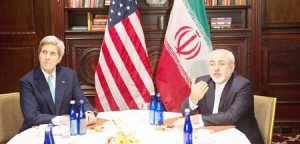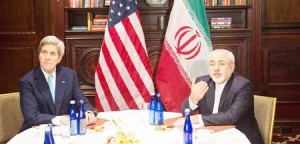Foreign Policy Magazine
ERIC B. LORBER, PETER FEAVER

Last week, David Francis and Lara Jakes published a report for Foreign Policy, titled “Sanctions Are a Failure… Let’s Admit That,” on the feeling in Washington that recent attempts to impose biting economic sanctions have not achieved their objectives and have led to unintended and negative consequences. Francis and Jakes’s reporting overstate the findings of the scholarship in this area, including some of our own.
To be sure, the powerful new financial sanctions employed by the United States and its partners over the past ten years present unique challenges and are not a magic bullet. Sanctions, however, have been an effective tool of diplomacy, both in pressuring rogue states like Russia and Iran to change their behavior and in denying terrorist organizations such as al Qaeda and Hezbollah access to legitimate financial services. More to the point, every tool of coercive diplomacy has costs and limits. And if sanctions are a failure, as Francis and Jakes’s reporting suggests, they might be surprised to see how poorly diplomacy will fare without any coercive leverage behind it.
The question is not whether financial sanctions have been successes or failures, but whether they can be effective when used in conjunction with other elements of coercive power, and whether they may be the best option available. Our own view is in line with what Treasury Department officials have acknowledged: that the ability of United States officials to successfully employ these tools of economic coercion can and should be improved.
Francis and Jakes report on the shortfalls in our recent sanctions history, including the United States and European Union’s inability to use them to convince Russia to fully cease its support for separatists in eastern Ukraine, or to pull out of the recently annexed Crimea. The mistake is grading these sanctions episodes as failures — a conclusion that is both distorted and premature, based on a misunderstanding of the reasoning behind them.
In the case of Russia, for example, it is true that the imposition of sophisticated sectoral sanctions — which use debt, equity, and technology restrictions to target particular industries — have not compelled Russia to relinquish its control over Crimea or cease its military support for separatists in Ukraine. Likewise, as Treasury Department officials admit, the primary cause of the economic pain in Russia at present is a drop in oil prices combined with the imposition of biting sanctions, not these tools alone.
But the United States and the EU imposed sanctions on Russia for a number of reasons, including an effort to push it towards the negotiating table and to deter it from engaging in additional destabilizing activities in Eastern Europe. While difficult to say so definitively, former State Department officials who worked on these issues — as well as current State Department officials with whom we have spoken in off the record conversations — suggest that the United States had good evidence that Russia was planning to increase the scope of its overt military support in Eastern Ukraine in order to wrestle key cities and territories away from Ukrainian government control, but thought twice after biting sectoral sanctions took effect.
This is not to say that the Russia sanctions program has been a resounding success; as we have written elsewhere, sanctions alone are unlikely to achieve the list of objectives that the administration has laid out. However, it is also unfair to say that these sanctions have failed, even if they have taken a toll on our European allies.
The Iran case is even more complex. Francis and Jakes’s reporting rightly reflects the fact that sanctions alone did not produce the economic pain that the Obama administration credits with catalyzing the negotiations. But no one we know who is involved in economic statecraft would defend such a strawman position. Sanctions are most effective when they can take advantage of other economic conditions, and when they are used alongside other tools of national power. For example, financial sanctions brought Iran to the table because they were used in conjunction with diplomacy, the (diminishing) threat of military force, and a concerted counter-proliferation campaign that according to news reports included a vast, offensive cyber warfare component that slowed Iran’s nuclear development significantly.
Moreover, Francis and Jakes note that tricky issues — such as the difficulty the United States has had in unwinding sanctions in a number of cases — suggest that sanctions may not be particularly useful tools of coercive diplomacy. We agree that unwinding sanctions can pose significant challenges to successful coercion, but if done right, by ensuring congressional cooperation, getting the buy-in of other key jurisdictions that are also involved in maintaining sanctions pressure, and providing certain assurances — where appropriate — to a reluctant private sector, the United States can successfully unwind these programs.
The authors’ reporting also undersells the impact recent sanctions have had on target state economies. In discussing whether sanctions have generally had an economic impact, they point to a recent Center for a New American Security study, which found that post-9/11 sanctions have not had significant impact on target-state GDP, as evidence that these sanctions may not be as powerful as policymakers assume them to be. But the article downplays the other interesting finding: Imposing sanctions does have an impact on foreign direct investment and the general investment climate in a target state. While these states can fend off this economic damage using capital reserves, at some point sanctions do have significant economic bite. Thus, the question of whether sanctions have an economic impact is murkier than Francis and Jakes’s reporting suggests.
Of course, sanctions do have limitations and over-using sanctions today can undermine the utility of the tool tomorrow. However, under-utilizing sanctions can likewise lead to sub-optimal outcomes. The challenge for statecraft is to know when and how to make the most of this powerful instrument of coercive diplomacy. The historical record suggests the following conditions are conducive to the successful use of these powerful economic tools:
When a sanctions target needs broad access to the full range of the financial system to do what it need and wants to do economically. Countries that are more integrated into the international financial system will also suffer more pain if they are cut off from it. Financial sanctions are therefore likely to have a greater impact when imposed on a country like Iran (which was integrated into Western financial markets until 2010) than when imposed on a country with little access that system (such as North Korea).
When cutting off a sanctions target from the international financial system can be done in a way that limits significant pain to the United States or its partners. As Francis and Jake rightly note, the Europeans are feeling the brunt of the impact of sanctions on Russia, due in large part to their closer business connections with Putin’s regime. As a result, the EU is under increasing pressure to lift these economic penalties in the coming months. To the extent that such pain can be mitigated, they will be more durable and more likely to affect a change in Russia’s foreign policy.
When an effective level of economic isolation can be achieved without having to go through the United Nations generally, or getting cooperation from Russia or China specifically. In other words, sanction work if a chokepoint exists and it can be made operative with mini-multilateral cooperation between the United States and its allies rather than full multilateral cooperation. The case of North Korea is instructive here: While the United States and the EU can increase pressure to an extent on North Korea, the linchpin to an effective constriction campaign on the hermit kingdom relies on Chinese cooperation. Being able to impose biting sanctions without having to turn to countries that have traditionally been unwilling or unable to turn these screws is an important determinant of whether financial sanctions can be effective.
When some or all of the leadership in the target county actually cares about the negative economic effects caused by the sanctions. In the case of North Korea, for example, comprehensive sanctions that are unable to put pressure on the ruling regime’s economic resources are unlikely to be successful, as the ruling party will be able to either evade the sanctions or transfer the costs to the general population. However, when those sanctions be directed at targets the regime holds dear — such as in the case of freezing leaders’ assets during the Banco Delta Asia episode — they are likely to be far more effective.
When the attractiveness of the target state’s markets is outweighed by the attractiveness of the sender’s markets. In the case of Iran, the incentive for potential partners to forsake connections with the U.S. markets in favor of Iranian markets was very low, as Iran’s market (both for energy products and other items) was comparatively small and underdeveloped. Thus, when the United States put forward a choice to foreign companies that they could either do business in Iran or the United States, but not both, most companies chose to continue doing business in the United States. This dynamic may not always hold, however. For example, if the United States were to consider imposing certain financial sanctions on China, many companies would choose to do business in the PRC when confronted with this choice.
When the sanctions can effectively be lifted in exchange for a change in behavior. As seen in the last few years, and particularly in the case of Iran and Burma, an inability to ease sanctions can seriously complicate Washington’s diplomacy. When sanctions are used as a way of bringing about certain policy outcomes, they contain an explicit threat and an implicit guarantee: If a state continues the unwanted policy, it will continue to suffer sanctions; if the state changes course, the punishment will end. But if the United States proves incapable of ending sanctions after its demands are met, the targeted state will have little incentive to favorably adjust its activities.
We are seeing this dynamic play out right now in the context of fulfilling our obligations under the JCPOA. Because of remaining non-nuclear sanctions on Iran, the international banking sector is unwilling to bank clients interested in doing business there, threatening the economic relief Iran believed it was promised as part of the deal and potentially undermining the agreement.
The challenge of successfully unwinding sanctions will continue to prove a significant obstacle to the effective use of coercive diplomacy moving forward, as Treasury Secretary Jack Lew recently acknowledged.
Note that even if all of these conditions hold, it does not guarantee that sanctions will cause the desired change in target state behavior. Rather, it simply means that sanctions can increase the likelihood of the desired policy outcome. It is still a matter for policymakers to determine whether the calculation of the costs and benefits of the alternatives support the decision to impose sanctions.
In the past few months, we’ve seen a recognition of the benefits — and the limits — of these tools. The thinking within policy circles is deepening on the costs and benefits of using this powerful form of statecraft. We shouldn’t revert back to broad conversations about whether sanctions have succeeded or failed, but should rather focus on the conditions under which they are likely — when used in conjunction with other tools of statecraft — to help us achieve our objectives.



